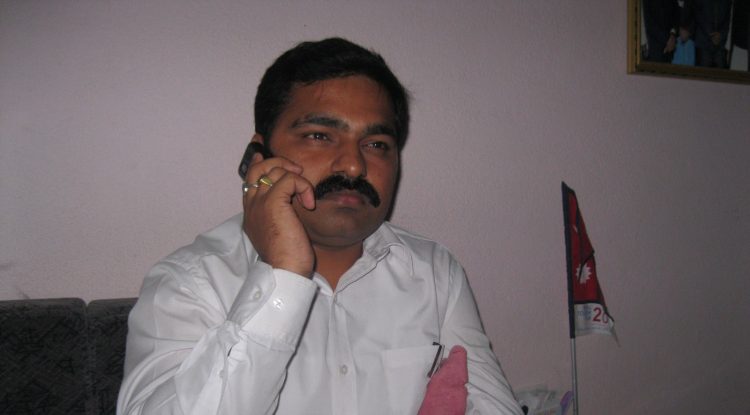Constitution doesn’t bar naturalized citizens from engaging in politics
Sujit Mainali / November 14, 2016

Abhishek Pratap Shah Photo: Sujit Mainali
Abhishek Pratap Shah, a parliamentarian representing the Federal Socialist Forum, Nepal in an article titled “International practices regarding naturalized citizenship should be followed” published in Naya Patrika on November 7 states the following:
“Although there is a provision to grant a foreigner woman, who is married to a Nepali man, naturalized citizenship through matrimony immediately after she gives up her citizenship, the provision barring her from engaging in politics is unfair.”
South Asia Check has examined whether the constitution of Nepal bars women with matrimonial naturalized citizenship from participating in politics or not.
Article 289 (1) of the Constitution of Nepal-2015 indeed bars individuals with naturalized citizenship from being elected, nominated or appointed to the posts of president, vice-president, prime minister, chief justice, speaker of parliament, chairperson of the national assembly, head of province, chief minister, speaker of provincial assembly and chief of security bodies.
But the constitution does not bar them from engaging in politics and assuming political positions other than the aforementioned ones.
Similarly the constitution has set some conditions for the individuals with naturalized citizenship or those with citizenship by birth to be eligible for other posts of the constitutional bodies.
Article 289 (2) of the constitution has mentioned that to be eligible for other posts of the constitutional bodies, a candidate with naturalized citizenship must have lived in Nepal for at least ten years. But those with citizenship by birth or women with matrimonial naturalized citizenship are qualified for the other positions in constitutional bodies if they have lived in Nepal for at least five years.
Therefore, parliamentarian Shah’s claim is wrong.
This material is copyrighted but may be used for any purpose by giving due credit to southasiacheck.org.
Comments
Latest Stories
- In Public Interest Covid-19 cases are low, but that’s not an excuse to avoid vaccination
- In Public Interest What is BF.7, the sub-variant that has the world by its grip?
- In Public Interest Threat of a new Covid-19 wave looms large amid vaccine shortage in Nepal
- In Public Interest As cases decline, Covid-19 test centres in Kathmandu are desolate lot
- In Public Interest Dengue test fee disparity has patients wondering if they’re being cheated
- In Public Interest As dengue rages on, confusion galore about what it is and what its symptoms are. Here’s what you need to know
In Public Interest
 Covid-19 cases are low, but that’s not an excuse to avoid vaccination
The Pfizer-BioNTech bivalent vaccines authorised by the Nepal Government provide better protection a...
Read More
Covid-19 cases are low, but that’s not an excuse to avoid vaccination
The Pfizer-BioNTech bivalent vaccines authorised by the Nepal Government provide better protection a...
Read More
- What is BF.7, the sub-variant that has the world by its grip?
- Threat of a new Covid-19 wave looms large amid vaccine shortage in Nepal
- As cases decline, Covid-19 test centres in Kathmandu are desolate lot
- Dengue test fee disparity has patients wondering if they’re being cheated
- As dengue rages on, confusion galore about what it is and what its symptoms are. Here’s what you need to know